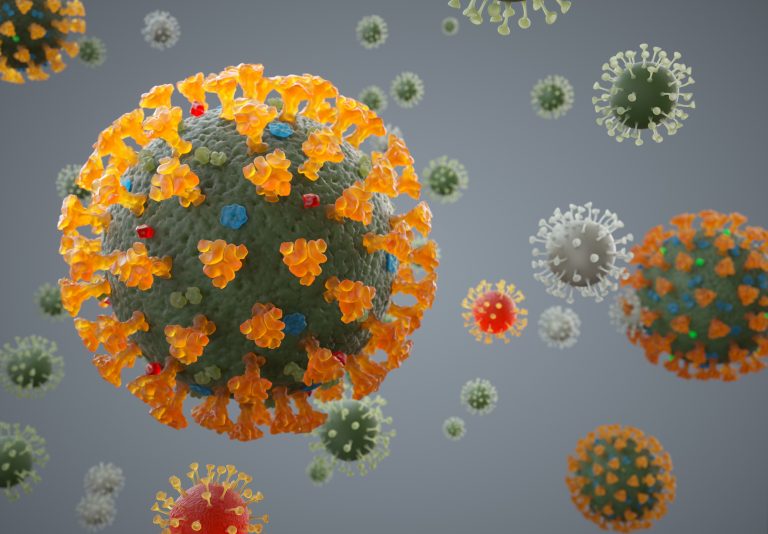
Since early on in the pandemic it has been clear that inflammation plays a big role in how people respond to SARS-CoV-2. This week researchers presenting abstracts at the AACR Virtual Meeting: COVID-19 and Cancer discussed how inflammation levels can improve prognosis in patients who also have cancer and how immune responses differ in cancer patients with COVID-19 versus those who just have the virus.
SARS-CoV-2 infection has a very variable impact on those infected depending on a number of different factors. Most people who are infected (around 85%) experienced mild-to-moderate symptoms and can recover at home.
A small percentage (around 15%) develop more severe COVID-19 and need hospitalization. It is still tricky to predict who will have a poor outcome from infection with the virus, but there are a number of factors that increase risk. These include older age, male gender, being immunosuppressed, and having another medical condition such as diabetes, chronic kidney disease or cancer.
Many of the adverse effects of severe COVID-19 disease are caused by excessive inflammation in the body, not dissimilar to that experienced by people having an extreme anaphylactic reaction, except in the case of COVID-19 the body is reacting to the virus rather than the allergen.
It is therefore unsurprising that having high levels of some inflammatory markers — such as interleukin-6 and tumor necrosis factor-α — on admission to hospital predicts a worse outcome, regardless of other risk factors.
Cancer patients already have higher than normal levels of inflammation due to their disease and have been shown to have worse symptoms and a higher rate of mortality.
“In patients with concomitant cancer and COVID-19 we see mortality rates up to 30%. So we have a critical need to be able to stratify patients risks within this population,” said Gino Dettorre, now based at St Jude Children’s Research Hospital in Tennessee.
To try and predict which cancer patients are likely to have a worse response, Dettorre carried out a study with colleagues while he was a graduate student at Imperial College London between February and June 2020.
“We wanted to be able to pivot our results to understand the exact parameters affected by severe COVID-19 and how this can be used to inform future therapeutic approaches risk stratification and survival predictions,” explained Dettorre.
The study recruited 1318 patients with cancer and Covid-19 to define what factors of the body’s immune response to Covid-19 infection could best predict outcomes.
The researchers tested whether a variety of different tests already in use in clinical practice could predict outcome in cancer patients with COVID-19. These included: the neutrophil-lymphocyte ratio, platelet-lymphocyte ratio, prognostic nutritional index, modified Glasgow prognostic score, and the prognostic index.
When the team corrected for factors that could bias the outcome such as gender, age, malignancy status, and others, they found that only the prognostic nutritional index, which is calculated based on serum albumin concentration and the peripheral blood lymphocyte count for a given patient, significantly predicted a poor outcome in this patient group (HR=1.97).
“With that knowledge we can conclude from all of our results that the systemic inflammatory response dynamically increases in response to active COVID-19, and predicts poor prognosis,” said Dettorre.
“The combination of hypoalbuminemia and lymphocytopenia is optimal for inexpensive and readily available prognostic testing, and in the context of COVID-19 and survival predictions in patients with cancer and COVID-19.”
From another study, also presented at the conference, Michael Chiorazzi, M.D., Ph.D., a researcher at Yale School of Medicine, reported results from a comparison of the immune response to COVID-19 in cancer and non-cancer patients.
The study included 17 cancer patients and 17 non-cancer patients admitted to Yale-New Haven Hospital with COVID-19 between March and June 2020. The non-cancer patients were matched to the cancer group in terms of factors such as age, gender, ethnicity and also COVID-19 severity.
Chiorazzi and team found that cancer patients did have similar antibody responses to infection with SARS-CoV-2 as non-cancer patients.
However, despite having similar viral load at the time of COVID-19 diagnosis, cancer patients had increased viral loads during hospitalization, suggesting they were struggling to clear the virus from their systems.
“As viral RNA load was increased in cancer cases we wondered whether this might be explained by altered immune responses in these patients,” said Chiorazzi.
They found higher levels of the cytokine inflammatory protein CCL3 in patients with cancer. “CCL3 is expressed primarily by macrophage populations, but also neutrophils and cytotoxic T cells, suggesting that these cell populations might be differently been upregulated in cancer cases compared to controls to produce the elevated CCL3 that we observed in cancer patients.”
In addition, the researchers also found lower levels of T cells in patients with cancer. Chiorazzi cautioned that the study was only carried out in a small group, but in a comparison between individuals in the cancer group that were treated with immune checkpoint inhibitors and those given standard chemotherapy those given immunotherapy had similar levels of T cells and activity to the group without cancer.
“Our results I think beg the question, what is the etiology of the differences in T cell activation subsets during COVID-19. Since we found evidence for higher viral RNA loads in cancer cases, one possibility is that this reflects more antigen present to lead to more T cell activation,” commented Chiorazzi.
“However, we saw no correlation between viral load and levels of activated or exhausted T cells in our data set. An alternative hypothesis is that chronic antigen stimulation, or differences in the cytokine milieu elicited by active malignancy, leads to a higher propensity for T cell activation and proliferation, leading to dysregulated immune response and poor viral clearance.”













